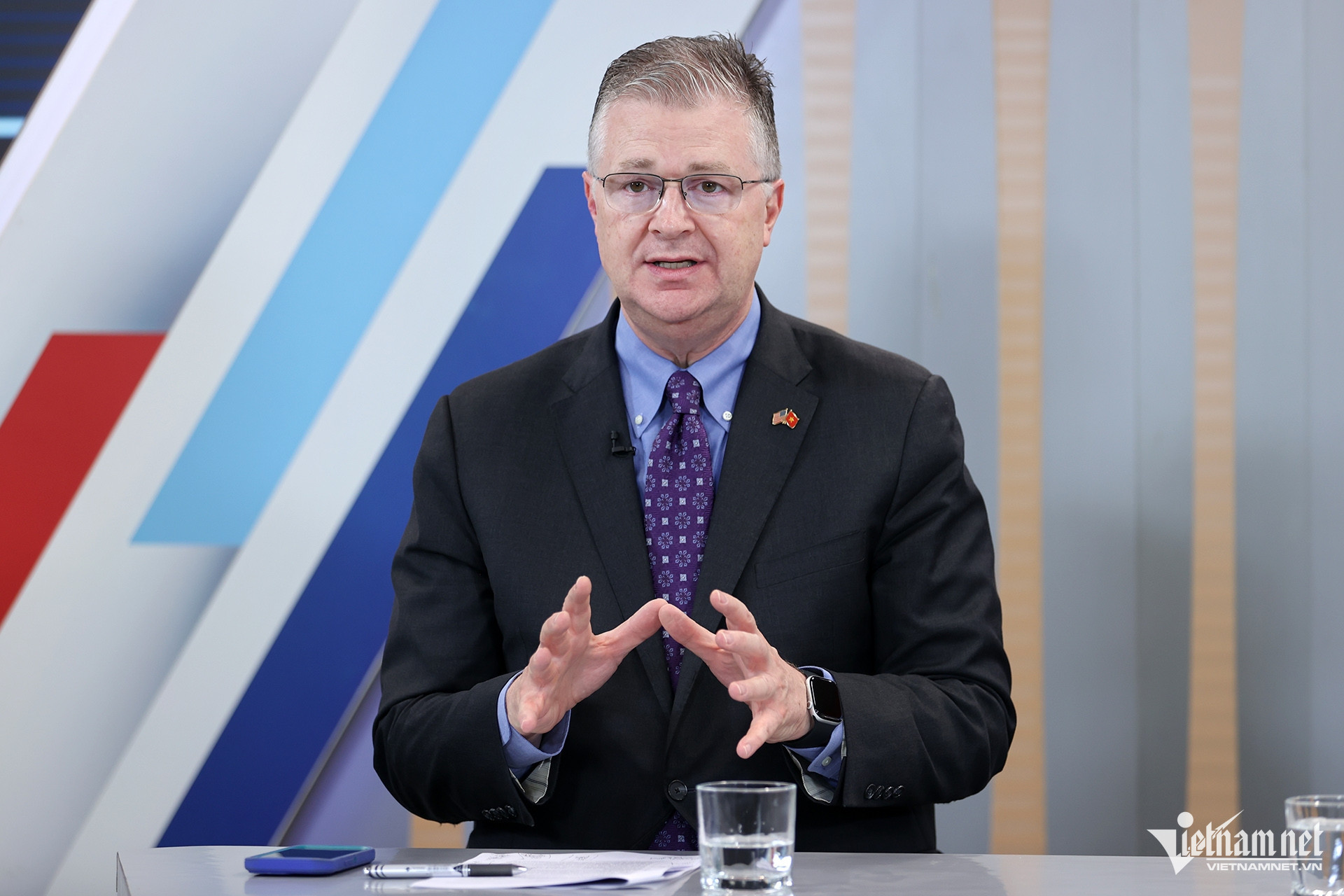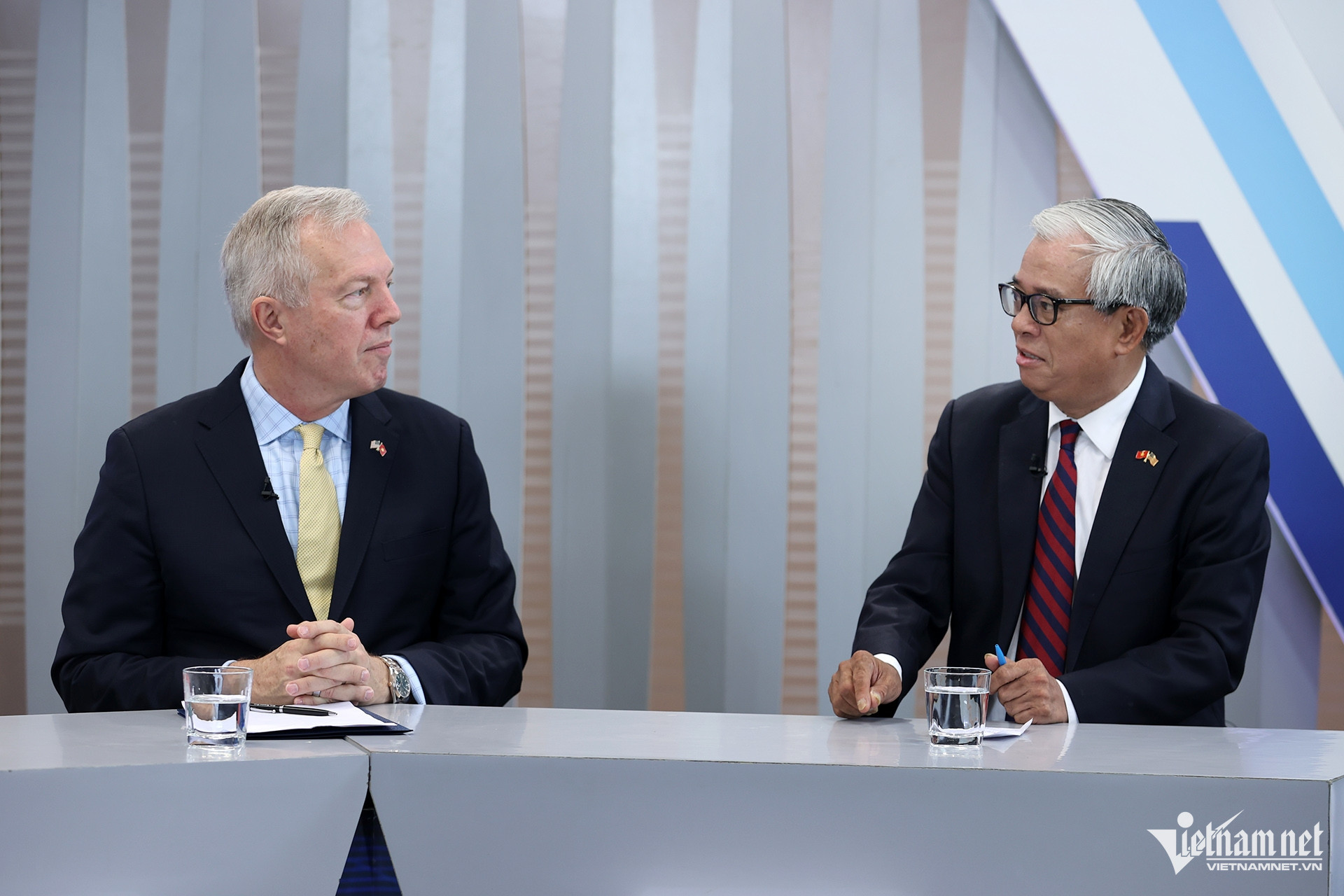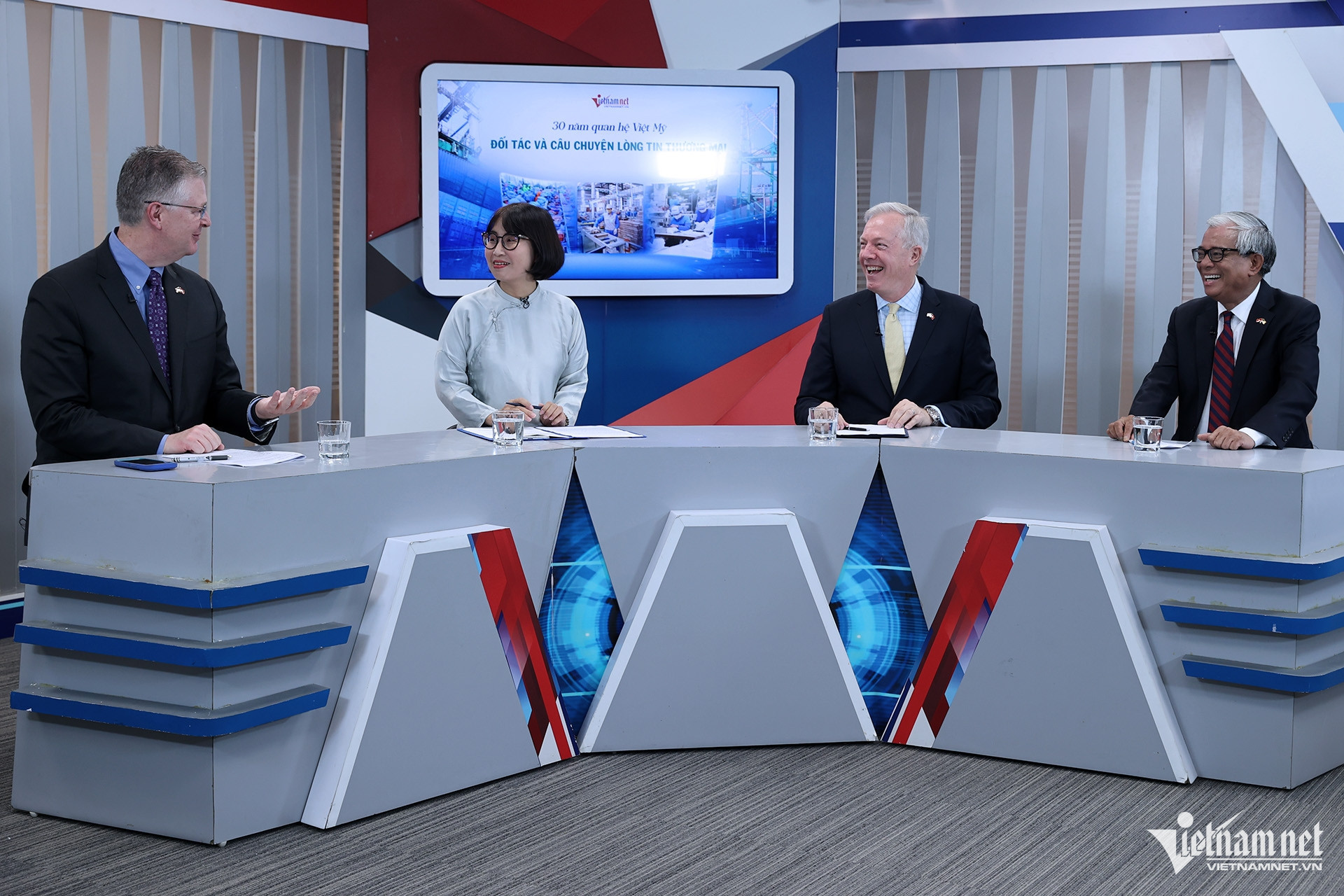Part 1: Vietnam-US relations: From normalization to trade powerhouse
What reforms does Vietnam need to build trust in trade?
Daniel Kritenbrink: That’s a great question. I believe that when you speak with U.S. trade negotiators and corporations, as Ambassador Osius mentioned, Vietnam has long been seen as an attractive investment destination. The Vietnamese government has sent a strong signal to foreign investors that the country is open for business, especially in key sectors.

As Ambassador Osius noted, I believe the Vietnamese workforce is highly educated, eager to be trained, and very productive. Vietnamese leaders consistently demonstrate a willingness to work with U.S. and foreign investors to resolve emerging issues.
That said, American investors and businesses would like to see greater transparency and certainty in the Vietnamese market, especially regarding measures that the government can proactively implement. I believe the government could simplify the approval process for major investment projects, shorten review times, and clarify procedural steps.
Given the critical role of supply chains involving information technology, high tech, semiconductors, and other industries in the global and Vietnamese economies, any effort by the Vietnamese government to clarify policies on data – including requirements for local data storage – would be helpful. I’m also aware that improving policies on taxes and financial regulations would make Vietnam even more attractive to investors.
All of these are important. But when it comes to specific measures the Vietnamese government could take to enhance trade relations with the United States, I believe Vietnam should continue to engage strategically and pragmatically, with a comprehensive mindset in negotiations.
Naturally, we need to negotiate more concretely on tariffs. But Vietnam has already entered into trade agreements in aviation, agriculture, and energy. Furthermore, Vietnam has addressed several issues related to market access and similar areas. I believe this comprehensive approach to trade negotiations, accompanied by domestic reforms to simplify and clarify legal regulations, is the formula for Vietnam’s sustainable success.
The four pillars for development in the new era
We’ve just discussed reforms. Now I want to emphasize the importance of proactivity. Ambassador Pham Quang Vinh, what should Vietnam proactively do in policy planning and implementation to enhance its strengths while minimizing risks in trade relations with the United States?
Pham Quang Vinh: It’s not only the U.S. that’s changing - the world is changing, and so is Vietnam. Vietnam aims to make progress across all areas, especially economically. That’s the big picture. More specifically, given the current challenges in trade with the U.S., we need a holistic approach from three angles.
First, in economic and trade relations with the United States, we must continue pursuing dialogue and negotiation solutions that ensure mutual benefit. Tariff issues should be resolved using the mechanisms we’ve employed, particularly by implementing the agreements reached between negotiating teams and high-level leaders.
Second, I fully agree with Ambassador Kritenbrink. We need to do more with American businesses. U.S. companies operating in Vietnam seek stability, clarity, and predictability in laws and regulations. Therefore, reforms that streamline processes and make things easier for businesses must be pursued more aggressively and rapidly.
We also need to support emerging industries that Vietnam requires. The Vietnam-U.S. Comprehensive Strategic Partnership emphasizes technology, innovation, digital transformation, and green transition. This demands strong efforts from us in building regulatory and legal frameworks, workforce training, and infrastructure. Let U.S. economists, investors, and entrepreneurs join Vietnam in its journey of innovation and economic advancement.

Vietnam must also ensure the sustainability of supply chains with the U.S. and diversify its global supply chains, especially by capitalizing on free trade agreements. While we’ve benefited from tariff reductions, now we must focus on improving product quality and Vietnam’s participation in global supply chains at higher, more advanced levels.
Third, as we rise in this new era, economic renewal to unleash domestic potential must be accelerated and aligned with higher development standards.
Vietnam’s four resolutions for development form what I call the four pillars for the new phase: streamlining administrative machinery and ensuring transparent, clear, and favorable legal frameworks; leveraging technological innovation; enhancing the role of the private sector; and deepening integration with higher quality. U.S. investors and businesses interested in Vietnam should be connected with the Vietnamese government and enterprises to work together on this journey.
U.S. businesses want to be part of Vietnam’s growth
On the evening of July 11, Prime Minister Pham Minh Chinh met with representatives of the U.S.-ASEAN Business Council. What were the council’s recommendations?
Ted Osius: Our recommendations echoed those of Ambassadors Vinh and Kritenbrink. First and foremost, our companies appreciate the ongoing administrative reforms, including streamlining government bureaucracy, reducing procedures, and decreasing the number of ministries and provinces.
These reforms are welcomed by foreign businesses and investors because they simplify market access, business operations, and investment in Vietnam. Investors no longer have to visit multiple agencies to obtain licenses. Ministries have been restructured, and processes are being updated to become more flexible and truly attractive to investors.
However, just because the resolutions have been issued doesn’t mean they’re being implemented uniformly across all levels. It will take time for things to run smoothly. The central government’s direction is clear, but personnel changes at various levels may cause delays. This is not what the Vietnamese government wants. We understand they aim for smooth processes for businesses. Therefore, the real challenge lies in execution.
Some corporations we represent noted slow implementation in specific cases, but overall, they remain optimistic about these reforms. They are especially excited about the emphasis on science and technology. Resolution 57 is vital because of the Vietnamese government’s consistent vision: to transition from a lower-middle-income country to an upper-middle-income country through innovation and a science-based economy.
To realize this vision, Vietnam will need many resources, most of which must come from the private sector. I hope much of this will come from American businesses. Vietnam will also need to establish substantial partnerships with U.S. and global companies, academic institutions, and research organizations. Therefore, I expect many discussions at the upcoming Party Congress on how to implement the vision in these critical resolutions.
The message the American business community conveyed to the Prime Minister was that they want to accompany Vietnam in this process. They believe the government’s vision is correct. They believe that growth through innovation and science-based development is the right path.
Nevertheless, some obstacles remain, such as tax policies. Visa regulations are also being updated, which will benefit businesses. Overall, however, American companies are excited about the ongoing reforms and eager to be part of Vietnam’s growth.
How can the U.S. support Vietnam in strengthening policy-making and business capacity?
Daniel Kritenbrink: I want to emphasize that the U.S. government should never forget the principles that have healed our two nations’ relationship – mutual respect and shared interests. Supporting a resilient, prosperous, and independent Vietnam aligns with U.S. national interests.
These principles have guided both the U.S. government and American corporations in investing in Vietnam. Therefore, I believe leading U.S. companies should continue to invest in Vietnam – including workforce training, as Ambassador Osius mentioned – and help Vietnam move up the global supply chain.
In 2023, when our nations elevated ties to a Comprehensive Strategic Partnership, the U.S. government pledged support for Vietnam in investing in high-tech supply chains. Funding from the CHIPS Act and the International Technology Security and Innovation Fund has enabled Vietnam to invest in these advanced supply chains. I believe this remains a key area of cooperation between our countries.
Currently, political dynamics in the U.S. are putting pressure on free trade policy. This poses a challenge for Vietnam, which will require strategic and skillful responses. I believe Vietnam’s accomplishments clearly demonstrate the mutual benefits of bilateral trade and show why investing in Vietnam aligns with U.S. national interests. This is crucial moving forward.
Multiplying benefits, understanding, and trust
From a diplomatic standpoint, what’s the biggest lesson in negotiating with the United States?
Pham Quang Vinh: Negotiating with the U.S. – or anyone – requires both empathy and reason. One must protect their national interests while keeping mutual benefit in mind. That’s the principle.
Vietnam-U.S. relations have always followed a path of building trust, making suitable offers, deepening understanding, and maintaining dialogue. That’s how we handled the recent tariff issues: we proactively presented our interests, considered those of the U.S., and remained persistent in dialogue.
This has always been our approach. Over the past 30 years, and even earlier, Vietnam-U.S. relations have included differences. That has required dialogue in politics, economics, and other areas such as environment and labor.
Over these 30 years, our relationship has deepened trust and understanding, not just between governments, but across Congress, businesses, researchers, and social actors in the U.S. who support Vietnam.
From normalization in 1995 to the Bilateral Trade Agreement in 2001, to WTO accession, the 2013 Comprehensive Partnership, and the 2023 Comprehensive Strategic Partnership – all these milestones show a trajectory of increasing trust, deeper understanding, and intertwined interests.
That’s the lesson in diplomacy: you must balance empathy and reason, while multiplying trust, benefits, and understanding.

Don’t give up – keep the dialogue going
If you could send a message to policy makers in both countries, what would it be?
Ted Osius: First, I want to echo Ambassador Kritenbrink’s message: a resilient, prosperous, and independent Vietnam greatly benefits the United States. That has guided our bilateral relationship over the years.
This relationship began 30 years ago when the two countries normalized diplomatic relations. President Clinton, with bipartisan support from Congress, declared that for America’s national interest, we must pursue friendship with Vietnam, not confrontation. The U.S. government should remember that as the two countries navigate trade tensions – it’s in our shared interest to build a strong, enduring relationship with this vital partner in the Asia-Pacific.
I’d add that the 184 corporations we represent are very focused on Vietnam and see tremendous opportunity here – a country of 100 million hardworking people and a government grounded in practical and achievable goals, growing faster than any other in Southeast Asia, and a key driver of global growth alongside South Asia. This is a relationship full of promise that we must not miss.
Daniel Kritenbrink: It’s hard to add anything after Ambassador Osius’s remarks, but I’ll emphasize two points. First, don’t forget what got us here: mutual trust and respect, including the commitment made over a decade ago to honor each other’s sovereignty, territorial integrity, independence, and political systems. Trust and respect are the foundation of this relationship. Because of them, we’ve built a friendship where we can speak candidly and honestly. Our negotiators must be transparent and pragmatic about both countries’ needs in the upcoming agreements.
And my final advice to negotiators from both sides is: don’t give up – keep the dialogue going. When we look at the incredible progress in U.S.-Vietnam relations over the past 30 years, even during tougher times than now, we should remain optimistic and keep negotiating.
I cannot overstate that the friendship and partnership between our countries were built on effort, commitment, dedication, and courage. Those same qualities are what our negotiators will need to move forward. I believe they will succeed.
Once again, I can call Vietnam home
Pham Quang Vinh: I fully support the final remarks from Ambassadors Osius and Kritenbrink. We share mutual interests in advancing this relationship. We’ve come this far based on crucial principles: mutual respect, respect for each other’s systems, and mutual benefit.
We have shared interests, and we have the capacity, trust, and determination to overcome historical challenges and build on the intertwined interests developed over the past 30 years.
The mutual benefits are substantial. The U.S. views Vietnam as a vital partner, and vice versa. The Vietnam-U.S. relationship involves bilateral interests that go beyond bilateral boundaries. Both countries care about ensuring peace, stability, and cooperation in the region, based on international law. We aim to work together for a better world - one that benefits all countries, including Vietnam and the U.S.
Ted Osius: I’d like to add one point. The companies I represent believe so strongly in Vietnam’s future that they weren’t comfortable with me working from Washington. They sent me here. I now live in Ho Chi Minh City because they see enormous potential in Vietnam - especially as the city grows into a regional financial hub. So we believe there are too many opportunities to miss. I’m happy to once again call Vietnam home.
Daniel Kritenbrink: I recently joined The Asia Group’s board to help promote U.S.-Asia economic ties, especially between the U.S. and Vietnam, just like Ambassador Osius. That’s why we have a dedicated Vietnam team and a growing client base here from various countries who all share confidence in Vietnam’s market.
Dear readers,
Thirty years marks a significant journey in Vietnam-U.S. relations, culminating in the establishment of a Comprehensive Strategic Partnership in 2023. This milestone provides a strong foundation for Vietnam-US trade to soon reach USD 200 billion.
Yet the road ahead presents many demands and challenges: strategic vision, transparent supply chains, and candid dialogue over disagreements - especially on tariffs and trade defense measures.
Our sincere thanks to Ambassador Pham Quang Vinh, former Ambassador Daniel Kritenbrink, and former Ambassador Ted Osius.
Thank you to our readers for joining the program. Until next time.
VietNamNet